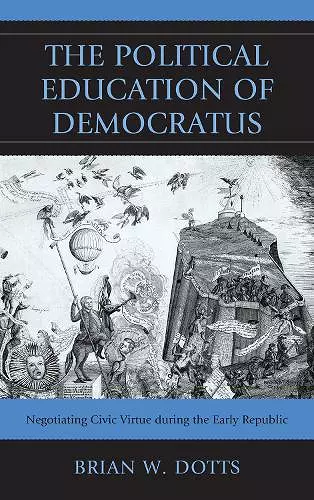The Political Education of Democratus
Negotiating Civic Virtue during the Early Republic
Format:Hardback
Publisher:Lexington Books
Published:15th Feb '12
Currently unavailable, and unfortunately no date known when it will be back

Thomas Paine described the American Revolution as educative. However, as examined in Brian W. Dotts’ The Political Education of Democratus: Negotiating Civic Virtue during the Early Republic, what was learned was neither standardized nor uniform. The Federalists, for example, viewed the revolution as a triumph for representative government, but one intended to maintain many remnants of the colonial experience. Anti-Federalists saw a confirmation of representative government at the state and local levels and considered the revolution as authenticating Montesquieu’s theories of republicanism. A third, more extreme interpretation of the revolution emerged from radical democrats who viewed the revolution as a fundamental break with mainstream thinking about republicanism. These radicals helped turn conventional understanding of representative government upside down, taking part in unconventional or extra-constitutional action during their negotiation of citizen virtue during the 1790s. Members of each of the societies took an active part in trying to fulfill their expectations for the new American experiment by contributing to the democratization of republicanism. The Political Education of Democratus illuminates the emergence of democratic thought from Aristotle and Machiavelli to more contemporary influences from the British Commonwealth tradition. Dotts examines how the radical ideas of Algernon Sidney, James Harrington, John Milton, Joseph Priestley, and Thomas Paine develop a rich tapestry among the democratic society’s correspondence, constitutions, resolutions, and early media. Individual members of the Democratic-Republican Societies, including Philip Freneau, Robert Coram, Benjamin Bache, George Logan, and others energized these radical interpretations of civic republican thought and plunged headlong into party politics, educating early Americans about the practical potentialities of democratic action.
Dotts (Univ. of Georgia) offers an interpretation of the views Americans held about citizenship education during the last years of the 18th century. In this well-researched, clearly written account, Dotts shows how the Democratic-Republican Societies, whose members included scientists, teachers, and artisans, emerged in response to the administrations of Washington and Adams. The members of these societies conceived of a republic more democratic than did the Federalists. The first chapter describes the ideas about education and politics prevalent in the late 18th century. The second considers the ideas of republicanism. The third compares the views of Tories, Whigs, and Radical Whigs in England. The fourth shows how the Radical Whig view infiltrated the colonies, and the fifth describes the ways Democratic-Republican Societies considered a democracy to be a plurality of interests moving toward the truth rather than a process seeking a prescribed goal. Interested readers might also consider Constituent Moments, by Jason Frank (CH, Sep'10, 48-0535), or Beyond the Founders, edited by Jeffrey L. Pasley, Andrew W. Robertson, and David Waldstreicher (2003). Summing Up: Recommended. * CHOICE *
We live in an age dominated by political talk about accountability in education, based on standardized test score results. This book offers a welcome antidote to such insufficient babble. The possibility that public education is best thought of in regard to its place in the political discourse of Republicans like Thomas Jefferson is worthy of serious consideration. This volume offers the reader just that serious consideration. -- Wayne Urban, The University of Alabama
ISBN: 9780739167205
Dimensions: 238mm x 166mm x 24mm
Weight: 585g
276 pages